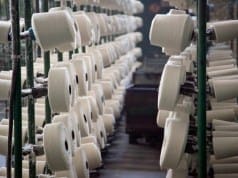Garment supplier factories must invest in reskilling workers in the digital space if they hope to retain business in a world becoming increasingly concerned with sustainability and social welfare, says GlobalData, a leading data and analytics company.
Hannah Abdulla, Apparel Correspondent at GlobalData, comments, “The Coronavirus pandemic has dramatically sped up the garment industry’s tech-shift and brands know that to operate in a sustainable and socially-conscious way, the adoption of technologies such as artificial intelligence, 3D design and automation is now a necessity and no longer just nice-to-have. A recent study from Global Data reveals that 81% of executives, including those from the apparel sector, say their businesses are not prepared for digital disruption.”
Clothing brands see consumers paying more attention to how sustainable their supply chains are and as a result brands are pressuring their supplier factories to be greener. The adoption of digital processes such as 3D design, automation and artificial intelligence carry huge green benefits including waste reduction at the production stage and less clothing going to landfills. 41% of apparel executives surveyed by Global Data believe augmented reality is the technology that will help them recover from the COVID-19 downturn.
Abdulla continues: “The opportunity is colossal, but supplier factories risk being left behind if workers are not upskilled for this digital shift. It’s going to require a whole new skill set to the ones workers in major garment manufacturing hubs like India, Cambodia and Indonesia have at present. The investment must focus on on-the-job training and skills development. The shift could result in hundreds of thousands of job losses as traditional garment manufacturing skills become obsolete. Yet, it could also see displaced workers move into new jobs if they have the skills required to do so, which could ultimately benefit economies. This shift is happening, and it’s happening faster than one might have expected this time last year. The time to get ahead is now.”

